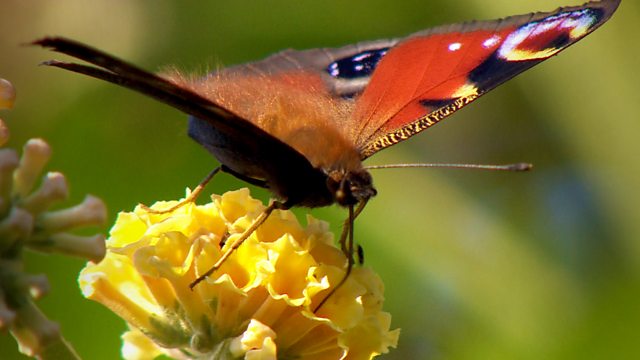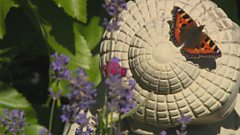
Episode 19
Gardening magazine. Carol Klein is in Hampshire to discuss the virtues of St John's wort and Joe Swift visits a very unusual allotment in north London.
Carol Klein is in Hampshire with horticulturist Roy Lancaster, appreciating the virtues of the often overlooked St John's wort.
Joe Swift is out and about, and visits a very unusual allotment in Tottenham, north London.
And Monty Don is at Longmeadow, where he reveals the secrets of his success when making compost.
Last on
Clips
-
![]()
Carol Klein and Roy Lancaster talk about Hypericum
Duration: 04:17
-
![]()
Joe Swift discovers a secret allotment
Duration: 04:21
Garden featured
The Sir Harold Hillier Gardens
Jermyns Lane
Romsey
Hampshire
SO51 0QA
Tel: 01794 369317/318
Carol Klein and Roy Lancaster visit the Sir Harold Hillier Gardens to explore Hypericums. The Hillier Gardens feature an arboretum and pinetum with meadows. They also have winter, bog and heather gardens, making it a place to visit all year round except Christmas and Boxing Day. The link below has opening times and other useful information.Â
Ìý(·É·É·É.³ó²¹²Ô³Ù²õ.²µ´Ç±¹.³Ü°ì)
Allotment featured

94 Marsh Lane Allotments
Marsh Lane
Tottenham
London N17 OHYÂ
Tel: 07903 211715
Joe Swift discovered a secret garden on a North London allotment site unlike any seen before. Created by Chris Achilleos, 94 Marsh Lane is a private place to relax in and escape to but it’s also a garden for sharing. Chris loves to share his space and the fruit it produces with friends, family and the allotment community around his unique plot.Â
You can visit Chris’s allotment as part of the NGS Yellow Book openings on Sunday 10th August between 2pm and 6pm. Chris also accepts visitors by appointment. To find out more follow the link below.Â
Ìý(·É·É·É.²Ô²µ²õ.´Ç°ù²µ.³Ü°ì)
Collecting and storing seeds

Throughout the year, keep an eye out for maturing seeds. When collecting seeds, look for healthy, strong plants and avoid harvesting from those showing signs of weakness or disease.
Find mature seeds which come away from the seed pod relatively easily and collect individual seeds or whole flower heads. Place seeds or flower heads in paper bags and write the plant name or description on it; labelling is the most important thing to do at this point.
Take your cue from nature and sow seed directly now or completely dry them, before storing and sowing next year. To dry seeds, place them in a bag of muslin in a jar or rice -Â the rice will absorb any excess moisture.
When the seeds are completely dry, place them in an air-tight food storage container in the fridge. This is also good place for storing for shop brought seeds which will stay viable for longer than if exposed to temperature extremes and moisture.
Ìý(·É·É·É.°ù³ó²õ.´Ç°ù²µ.³Ü°ì)
Composting grass

Compost should be made from a balance of green and brown material. Green material is anything with fresh green growth, lawn clippings or vegetable matter that breaks down quickly. Brown material includes shredded twigs and other woody material but also cardboard and meadow cuttings (the fibrous long grass of a meadow takes a lot longer to compost than bright green, fresh lawn mowings).
Too much green material and the compost will start to become aneorobic and smell unpleasant. The material in the heap will be very wet and will turn to sludge. Too much brown material and the compost will stop decomposing; it will feel cold and take a long time to break down.
If you have too much of one type of material, just add more of the other to the mix and fork it over. By balancing and mixing the ingredients you should be able to rectify the compost mix and eventually you will have lovely, crumbly, compost that smells good.
(www.rhs.org.uk)
Jobs for the weekend: Cut back flowered mint
The lush green leaves of mint are starting to get old now and the plants are flowering. To make sure you still have some mint for use in the kitchen, cut back flowered plants in sections, leaving a little still growing. As the cut section starts to regrow, cut back the other section. Reducing mint now will reinvigorate the plant and give you fresh green leaves right into autumn.Â
Ìý(·É·É·É.°ù³ó²õ.´Ç°ù²µ.³Ü°ì)
Jobs for the weekend: Plant out and protect winter cabbages
Winter brassicas, such as January King cabbages, should be planted out now. When planting, firm the soil around the roots and finish by protecting them from birds and cabbage white butterflies by using a net.  Brassicas are hungry plants and so will need to follow beans or peas in your rotation. The widest spacing for winter cabbages is around 50cm (20inches) apart, but if you don’t have a lot of room, smaller spacings will simply give you smaller heads.
(www.rhs.org.uk)
Jobs for the weekend: Water plants directly at the roots
When watering your garden, resist using a sprinkler and use a hose or watering can to drench roots directly. If you do have to use a sprinkler then make sure you do so at night or when it’s cooler so you don’t lose too much through evaporation.
As you water, give plants a really good soak; it’s better to give plants a long soak once a week than a sprinkle every day.Â
(www.rhs.org.uk)
Credits
| Role | Contributor |
|---|---|
| Presenter | Carol Klein |
| Presenter | Joe Swift |
| Presenter | Monty Don |
| Series Producer | Christina Nutter |
| Series Editor | Liz Rumbold |
Broadcasts
- Fri 1 Aug 2014 20:30
- Sun 3 Aug 2014 09:20
- Thu 7 Aug 2014 10:05


